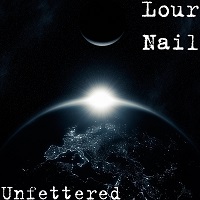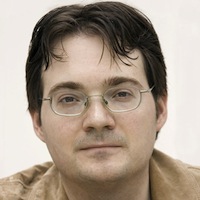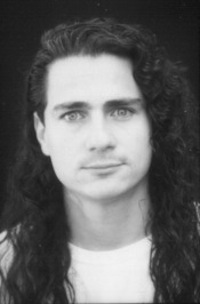“Unfettered,” the tune: it’s a fight song. It incorporates every story in the anthology of the same name. I wrote it to help a friend—to help anyone fighting cancer. And you can listen to it on Tor.com first.
it’s a fight song. It incorporates every story in the anthology of the same name. I wrote it to help a friend—to help anyone fighting cancer. And you can listen to it on Tor.com first.
The best answer to most questions is: Music. I’ll illustrate with a story. When asked by Shawn Speakman to contribute a video describing my involvement in the Unfettered anthology—to help get the word out—I replied: How about I write a song instead. Besides writing fiction, I’m also a musician. And music hath charms.
But I’m also a marketer by day. And it’s hard to turn that off. I’ve sat with Shawn at more sushi tables than I care to count sharing ideas with him on how to market a book or event or author. Some are solid, simple things. Some are extremely disruptive. Things Shawn replies to by saying: No one will ever do that; too many waves.
Also, as I mentioned, I’m a musician. An even harder thing to turn off. And really, why would I try.
So, back to the story. When asked for a promotional video, my marketing and musician hats conflated, and I started down a path to write a song that would hopefully get shared around, and consequently raise some awareness about the Unfettered anthology.
Then, I thought: It can’t just be a song; it’s got to tie to the book in some interesting way. I could have produced something that’s consonant with the “unfettered” theme. But that didn’t seem enough. My thinking quickly evolved to the notion of lyrically incorporating all the tales in the anthology as a way of tipping my hat to the many writers who contributed free stories to help Shawn pay back his medical debt. And so, that’s what I’ve done.
In some cases, I’ve woven bits of an author’s story with some slight interpretation of my own. In other cases, I’ve borrowed a seminal word or two from the fiction itself. And then here or there, I’ve done a high level summary or thematic recounting of the story’s core. These choices were made in my attempt to have the song hang together as its own thing, in the event the listener hasn’t read the book. Of course, for the listener who has read the book, I think there are added levels of resonance.
Regardless any of that, at the end of it, my purpose was to say thanks to a number of writers while promoting a book to help a friend. And doing all that while making music? Kind of a perfect storm of awesome.
So, as I got underway, one of the very first decisions I needed to make was: genre. I thought seriously about something anthemic in the Broadway tradition. Think: “This Is the Moment” from Jekyll & Hyde. I considered something intimate and poignant, probably just voice and piano or voice and acoustic guitar. Think: “Someone Else” by Queensryche. I thought maybe to ask Shawn about his favorite music styles, use one of those. At times, I heard in my head “Follow You Into the Dark,” you know, all singer-songwriter-y. And of course, I could well have done something progressive, which is a favorite style of my own. I probably considered twenty different genres and song-types.
But I didn’t land on any of these. And the reason is because I didn’t want the entire song to be a thanatopsis (good word, right?), and I didn’t want to get mushy about loss or love. No, what I wanted was: a fight song! Shawn was fighting back. I wanted to echo that spirit. Now, there are great Broadway fight tunes, e.g. “Do You Hear the People Sing” from Les Miserables. But somehow that didn’t seem quite right. So…
Where did I end up? Power metal. A few of you just groaned. Bear with me, and consider: something strong, uncompromising, driving, easy to sing along to, gets your blood pumping, and maybe even with some epic orchestral bits. Yeah, power metal was the right way to go.
As an aside, I find it funny (sometimes insulting, but mostly funny), that so many of the folks who meet me make the assumption I’m a metal head. Given that, they might not be terribly surprised by my genre choice. Truth is: I’m nothing of the sort. I love a lot of metal. But I listen to an equal amount of jazz, classical, standards, 50s and 60s rock, Broadway, blah, blah. I tell you all that because I didn’t land on the genre without some thought.
Anyway, once I’d chosen the genre, and knew my libretto (as it were), I got started. That meant that I enlisted the help of my long time friend and collaborator Primo. Together, we’re releasing music under the band name: Lour Nail. It’s a reference to a character in book 2 of my fantasy series. Primo and I have written a lot of music together, and I love working with the guy. Once he was on board, we began putting together riffs and progressions and structure. Lots of tweaking took place. And in this instance, we stretched a little by doing the orchestral section you hear in the song—we’ve not done anything exactly like that before.
Originally, I wanted that section to stand alone, just a great instrumental passage with epicness. Something that sounded cinematic and triumphant. Then, as we were getting it wrapped up, Primo turns to me and says, “You’re going to sing over that, right?”
I honestly hadn’t planned on it. “No, I thought we’d let it stand.”
I can’t remember his reply exactly, but it amounted to: “Dude. Rock.”
Properly chastened, I set to writing vocals to the orchestral section, which for me turned out to be the most fun of the whole tune.
Now, I’m going to go through the lyrics in a moment, where I’ll talk a little about the way each line is inspired by a different story in the anthology. There’s information about the stories to give context to the lyric writing process, just so you know.
I’m going to drop the song in so you can start listening to it here. When you play the song, please kindly turn it to eleven.
[soundcloud url=”https://api.soundcloud.com/tracks/107306079″ params=”color=ff5500″ width=”100%” height=”166″ iframe=”true” /]
Please share. The song helps promote the book. And book sales and song sales go to help Shawn pay back medical debt and to support cancer research. Direct links to it here: iTunes, Amazon; and you can find it elsewhere, too.
Now, I know folks who don’t really care about lyrics in music. I know musicians who feel the same way. But in this instance, the lyrics are more than vowel sounds set to music. They’re that “tip of the hat” to the contributing writers that I was mentioning. So, while you might just want to hear the tune, I invite you to take a trip through the lyrics with me, as they’re inspired by some great fantasy writers. And with any luck, the whole is greater than the sum of its parts.
“Unfettered,” verse one:
River of souls
It will ebb and flow
 These lines are drawn from the Robert Jordan/Brandon Sanderson story, “A River of Souls.” Duh. This seemed a fitting place to begin, for many reasons. First, let’s be honest, for many readers, this was the primary (or at least initial) reason for buying the anthology. I don’t blame them. Might well be the last bit of Wheel of Time fiction we ever see. Momentous.
These lines are drawn from the Robert Jordan/Brandon Sanderson story, “A River of Souls.” Duh. This seemed a fitting place to begin, for many reasons. First, let’s be honest, for many readers, this was the primary (or at least initial) reason for buying the anthology. I don’t blame them. Might well be the last bit of Wheel of Time fiction we ever see. Momentous.
Beyond that, the metaphor is a big one. And somewhat familiar. It stands as a nice up-front frame for the rest of the song. Because we’re going to talk about many of the things that take place to harrow a soul. So, it was nice to establish some poetic bedrock against which to cast some heavy examples of burdened souls, since we are, of course, going to try and unfetter them.
 Metaphorically, a river of souls ebbing and flowing has many meanings. I don’t need to try and list them for you. But as relates the Wheel of Time, the short story in Unfettered has Bao going into the maw of the river and returning as the Wyld. The river, long disused, has produced a leader of war. Bao is changed. And he’ll attempt to bring change. In doing so, one can imagine that souls will swell the river. War does that.
Metaphorically, a river of souls ebbing and flowing has many meanings. I don’t need to try and list them for you. But as relates the Wheel of Time, the short story in Unfettered has Bao going into the maw of the river and returning as the Wyld. The river, long disused, has produced a leader of war. Bao is changed. And he’ll attempt to bring change. In doing so, one can imagine that souls will swell the river. War does that.
Like the Hadeshorn
Roils with a man’s despair
 Terry Brooks’ readers will recognize the reference, Hadeshorn. For the most part, I steered away from specific terms like this in the song. I didn’t want there to be too much insider knowledge necessary to “get” the tune. But, in this instance, I had a hard time delivering the salience without it, just as I had a hard time not wanting to nod to Terry in this way. So… I left it in. I’ll also admit that I had to call Terry to learn the proper way to pronounce the word, which you find in his story, “Walker and the Shade of Allanon.”
Terry Brooks’ readers will recognize the reference, Hadeshorn. For the most part, I steered away from specific terms like this in the song. I didn’t want there to be too much insider knowledge necessary to “get” the tune. But, in this instance, I had a hard time delivering the salience without it, just as I had a hard time not wanting to nod to Terry in this way. So… I left it in. I’ll also admit that I had to call Terry to learn the proper way to pronounce the word, which you find in his story, “Walker and the Shade of Allanon.”
For non-Brooks readers, maybe it’ll suggest a menacing place they’d like to read about. Because, it is roiling with man’s despair. Or at least, that’s a bit of how I feel about this place. And frankly, the water imagery and import mapped well against “River of souls,” so there you go.
In any case, part of the tone the Brooks lines help me establish is that the waters of the soul are often troubled. Whenever a character approaches the Hadeshorn they hear the sibilant rush of departed voices. I usually wind up thinking about them much as I do the spirits in Dickens “A Christmas Carol,” who agonize over things they left undone.
This may well be an Orullian interpretation, but make no mistake, going to the Hadeshorn is an ominous thing. It’s on the edge between this world and the next. You play it careful there. And that’s the metaphorical edge I needed before diving into examples of how life becomes troubled.
Verse two:
One child’s guilt is endless
His family burned
 These lines are inspired by Peter Brett’s story, “Mudboy.” One of my favorites in the anthology. In part, I’m fond of it because the “protagonist” is a child. I loved It and Summer of Night and Boy’s Life for the same reason. In any case, the ending of this story is a kick-in-the-gut. Brett does some impactful stuff with a fire and the child’s family and the feelings the child experiences in the very last sentence of the tale. Come to that, I suspect both King and Simmons would approve of the way Brett ties it off.
These lines are inspired by Peter Brett’s story, “Mudboy.” One of my favorites in the anthology. In part, I’m fond of it because the “protagonist” is a child. I loved It and Summer of Night and Boy’s Life for the same reason. In any case, the ending of this story is a kick-in-the-gut. Brett does some impactful stuff with a fire and the child’s family and the feelings the child experiences in the very last sentence of the tale. Come to that, I suspect both King and Simmons would approve of the way Brett ties it off.
And these lyric lines are also where I begin giving examples of the way in which life can be harrowing. In this case, a child who makes a costly mistake. My construct has, thus, begun to play out. And part of that is this: the challenges and mistakes of a life can become binding. ”Fettering,” if you will.
Another spends a coin
From a rapist’s hand
 I draw this from Robert Redick’s story, “Nocturne.” This tale is another of my favorites. There’s a marriage of content and form in this story that I don’t think most writers can pull off. It doesn’t hurt that it’s about a student of music. But honestly, that’s not the thing. Here, we have an excruciatingly simple act, where a brother carries his sister’s husband/rapist across a pig sty to earn her freedom.
I draw this from Robert Redick’s story, “Nocturne.” This tale is another of my favorites. There’s a marriage of content and form in this story that I don’t think most writers can pull off. It doesn’t hurt that it’s about a student of music. But honestly, that’s not the thing. Here, we have an excruciatingly simple act, where a brother carries his sister’s husband/rapist across a pig sty to earn her freedom.
I found it ingenious, poignant, and suspenseful. In this story there’s unique kind of lyricism, and the denouement is brilliant. I wanted badly to encapsulate the tale in a few brief words. Impossible. But you can see my attempt. And it’s another example of a life lived hard. With consequences.
Now we get into the first chorus:
In your mind you’ve the strength to fight your demons
Okay, now this phrase comes from Terry Brooks’ “Imaginary Friends.” Here we have a young boy who is sick in the more serious way that makes parents whisper or leave the room. And the boy here winds up with an imaginary friend that helps him through it.
Quite obviously, I translated that to the ability one might have of combating bad stuff—like mortal illness—with his or her mind. I’ve actually read case studies where cancer patients have dome similar things. Cynics won’t believe it. That’s okay. It’s not required of them. For the song, in any case, I liked the allusion to someone deciding to martial their own resources to see to the fight that needs fighting. You get it. And the chorus, then, begins to suggest some hope against the pains of life.
The beauty might even stay the hand of God
 Jacqueline Carey’s contribution to Unfettered is a story entitled “The Rose of the Martyrs.” I read this story, and liked it. But it wasn’t until I reread portions of it to write the lyrics that one of the core ideas really struck me. Or at least, a part of the story that captured my imagination, and that is: Beauty as a weapon.
Jacqueline Carey’s contribution to Unfettered is a story entitled “The Rose of the Martyrs.” I read this story, and liked it. But it wasn’t until I reread portions of it to write the lyrics that one of the core ideas really struck me. Or at least, a part of the story that captured my imagination, and that is: Beauty as a weapon.
I’m quite familiar with the notion: music as a weapon. It’s in my own series. But this. It made me stop and think. I believe I extrapolated a bit with it—my own reader’s inflation, perhaps. But taken to its final possibility, I imagined what it might do. And then tied to the preceding line, it became a larger statement still. Several, in fact. I don’t want to spell those out, though. I’d prefer you do that for yourself. But catch me at a con sometime, if you want to jaw over it.
I did, though, like drawing a correlation between using one’s mind to battle your personal demons, and beauty. I found it a beautiful metaphor, to put a fine point on it.
Follow and you’ll die, unbowed I’ll honor life
 Folks, I met a guy at Miscon in Missoula, Montana a little over a year ago. He was half of the duo that laid down cash to induce one of only two karaoke moments in my life. I have this thing about karaoke. Anyway, Eldon Thompson and Ty Frank, they were. And Eldon… well, one of the nicest guys I’ve ever met. A physical specimen—his muscles have muscles. And he’s a writer you should be watching for.
Folks, I met a guy at Miscon in Missoula, Montana a little over a year ago. He was half of the duo that laid down cash to induce one of only two karaoke moments in my life. I have this thing about karaoke. Anyway, Eldon Thompson and Ty Frank, they were. And Eldon… well, one of the nicest guys I’ve ever met. A physical specimen—his muscles have muscles. And he’s a writer you should be watching for.
His story, “Unbowed“ has a great character who follows our point-of-view protagonist down into a cavern. She pays for it. And our POV character is himself rather honorable. With an edge. But honorable.
And this, song-wise, is where the chorus transitions to the possibility that maybe that “demon” you’re going to fight might get the better of you. This is a thing you think about when a friend gets cancer, as my friend Shawn did. Because you don’t have much you can do except esteem their fight. And maybe a few other, little things. Like write a song. Even when that song needs to acknowledge the possibility of a bad ending.
And I’ll never regret, and hour I spent in her light
 Blake Charlton and I share a unique bond. I actually can’t talk about it here, because I think it’s too raw a topic. But suffice to say that we have far and away more DRM tweets to one another than the ones y’all see. Blake wrote the story, “Heaven in a Wildflower.” In a word: beautiful.
Blake Charlton and I share a unique bond. I actually can’t talk about it here, because I think it’s too raw a topic. But suffice to say that we have far and away more DRM tweets to one another than the ones y’all see. Blake wrote the story, “Heaven in a Wildflower.” In a word: beautiful.
This story hit me where I live, because I have a daughter. And while his character’s daughter and my real daughter are radically different, the paternal feelings Blake writes about are the same. And what I love about this story is that Blake goes inside the grief. Talks about it. And there’s sacrifice here, too. Laying it on the line for someone you care about is heroic. In this instance, it’s not swords and flashes of fire. It’s taking a mortal risk in the quietest, perhaps most important way—giving a child life, regardless of the personal cost. And yet this story never feels heavy. Kudos, Blake.
One last note. The little girl in the story is born as/from a nimbus of light. This reference to the child and her light is important to the song in it’s last chorus, as it plays against another line. I’ll come to that later. So, remember the child’s relationship to light, if you’re following along.
My line here talks about the way you feel when things come to an irreversible end, but you know you’ve made a good call. The right one.
To tie off the chorus, then, I wanted to talk to concepts of ways/things that give us power/hope relative to some of the ways we become troubled in life, e.g. guilt, hardship of any kind. And I wanted to acknowledge that sometimes it gets the better of us, from a corporeal perspective, but that we can nevertheless stand above it with honor and without regret.
Verse 3:
Violence, threat, and pleasure, a dog sound
He is just not the same
 My friends, Daniel Abraham’s story, “Dogs”… dark. But not like vampires or zombies or what have you. This is the horror of rape. And more specifically how it changes a person. How it robs one of enjoying simple things. Of even having simple things.
My friends, Daniel Abraham’s story, “Dogs”… dark. But not like vampires or zombies or what have you. This is the horror of rape. And more specifically how it changes a person. How it robs one of enjoying simple things. Of even having simple things.
It was easy selecting a section of the song to sing about Daniel’s story—I picked the heaviest part. Verse 3 comes in after the first chorus with a bone-crunching guitar riff and the strings removed. It’s rhythmic, and probably the most metal section of the song. And while you could easily treat the subtle darkness of the tale with a soft, intimate song or part, that’s not what my song here is about. It’s in your face. And you know, I’m pretty sure Daniel wants you to be uncomfortable. To wit, this is the one section in the song where I rough my voice.
Also, about the words themselves. The first line is drawn almost verbatim from the story. The second line is the consequence of the horrific, uncomfortable event early in the tale. For me, though, everything after that event is the dark part. Living with the aftermath is often worse than the moment of horror itself.
Teeth are not just the province of dogs, though
Watch as a dad walks away
 Let me tell you a quick story. Of all the author events I’ve ever been to (readings, Q&A, panels, etc.), the best was Bob Salvatore’s at U Books. Why? Because he just got up, took questions, told stories, and was hysterical and witty and charming.
Let me tell you a quick story. Of all the author events I’ve ever been to (readings, Q&A, panels, etc.), the best was Bob Salvatore’s at U Books. Why? Because he just got up, took questions, told stories, and was hysterical and witty and charming.
And while we all know R.A. for his many D&D books, this tale is nothing like those. It’s about a young kid playing outfield at a baseball game. Little league, man. This is apple pie stuff. I relate strongly here, because baseball is my favorite sport. I’ve played all my life—until college anyway. Every year until then, though. So, I get this tale.
The young protagonist is worried about the ball coming his way. You know, insecurity. Wanting to do a good job for his team, his coach… his dad.
Only here, the kid doesn’t make the catch. And when things go south, they do so in a horrific, fiction-twist way I won’t reveal entirely. Though, I’ll say that “teeth” is the other common denominator (after the horror element), that made placing Bob’s story next to Daniel’s the right choice.
However… it’s not the “teeth” thing that’s the horror here. It’s after the boy’s failure, he watches his father abandon him, walking away in shame at his son. Disappointing someone you love, particularly seeing it drive your dad away… damn. Just damn. Hit me hard. Haunting. Heavy. So yeah, more roughing the voice to get the emotion of this one out. And absolutely had to be in this section of the tune.
Verse 4:
Lazarus wants death
And doesn’t care who pays
 “The Unfettered Knight” is Shawn Speakman’s story. I do give a bit away with my lyric here. Don’t kill me. But to give impact to the reason for the character wanting death, I kind of had to. The more important part, though, is the second line. In his attempt to stop being “undead,” Lazarus seeks a unique weapon capable of setting him free. But there’s a high measure of selfishness in his quest, as it has far reaching consequences for the rest of the world.
“The Unfettered Knight” is Shawn Speakman’s story. I do give a bit away with my lyric here. Don’t kill me. But to give impact to the reason for the character wanting death, I kind of had to. The more important part, though, is the second line. In his attempt to stop being “undead,” Lazarus seeks a unique weapon capable of setting him free. But there’s a high measure of selfishness in his quest, as it has far reaching consequences for the rest of the world.
Note: There’s a lot more to how Shawn casts Lazarus that I haven’t revealed here. Never fear. And the whole affair starts in the Vatican vaults. The exchange there between Lazarus and Shawn’s knight was my favorite part of the story. That, and the sense in which one winds up disliking Lazarus, not because he’s threatening others in order to get his way (he needs something in order to die), or because he’s basically an undead monster. No, he’s dislikable because he’s selfish, because he couldn’t give a damn what happens to anyone else, as long as he gets to be dead dead. Shawn did a nice job of building that nuance.
While a child’s dead pet
Has the heart to stay
 I knew as soon as I read David Anthony Durham’s somewhat whimsical piece, “All the Girls Love Michael Stein”, that I’d pair it with Speakman’s story. Reason: as opposed to Shawn’s Lazarus, who wants to die (or stop being “undead” to be precise), Durham’s protagonist—a cat—elects, even in death, to stick around. And what’s more, the cat wants to help others.
I knew as soon as I read David Anthony Durham’s somewhat whimsical piece, “All the Girls Love Michael Stein”, that I’d pair it with Speakman’s story. Reason: as opposed to Shawn’s Lazarus, who wants to die (or stop being “undead” to be precise), Durham’s protagonist—a cat—elects, even in death, to stick around. And what’s more, the cat wants to help others.
The story has a lot of charm. Tonally, it’s unique in Unfettered. And where the anthology’s theme is concerned, Durham’s story plays a bit, too. The cat has become unfettered from this mortal coil, but elects to remain fettered to his departed owner (and human’s at large) in an effort to prove useful to them. Nice turnabout.
So, as with the first and second verses, verses three and four give us example of bad stuff. Stuff that makes life less awesome—rape, shame, betrayal, selfishness, etc.
With that, we go into the second chorus:
A dragon in the stars
 This short line is attributed to Naomi Novik’s “In Favour with Their Stars.” First I’ll say, I tried to be somewhat balanced in how much “air time” each author’s story got. I did so because I’m that guy who hates when others butt in line and the like. I appreciate fairness. Demand it, maybe. Hard line to take in a world that doesn’t often give a damn for fairness. But that’s the cloth from which I’m cut. However, it did prove impossible to be a hundred percent balanced with each story in the song. My good fortune is that, for the most part, writers are a gracious crop. That said, I was deliberate with those authors I placed in the chorus, since as you know, the chorus repeats.
This short line is attributed to Naomi Novik’s “In Favour with Their Stars.” First I’ll say, I tried to be somewhat balanced in how much “air time” each author’s story got. I did so because I’m that guy who hates when others butt in line and the like. I appreciate fairness. Demand it, maybe. Hard line to take in a world that doesn’t often give a damn for fairness. But that’s the cloth from which I’m cut. However, it did prove impossible to be a hundred percent balanced with each story in the song. My good fortune is that, for the most part, writers are a gracious crop. That said, I was deliberate with those authors I placed in the chorus, since as you know, the chorus repeats.
About Novik’s story, the line kind of tells you what’s what. Her Temeraire… yeah, gone to space. Cool stuff, this. In context of how I’ve tried to weave bits of the stories into an idea that hangs together as something larger and yet still related to the book, here’s where I piece together a few tales that I was able to leverage in solid metaphoric ways.
You may or may not know that there is, in fact, a “dragon” constellation. I liked the allusion there, though it’s nothing to do with the story. Beyond that, a dragon by itself is a powerful symbol and metaphor. And placing it literally and metaphorically in the heavens has mythic tones of living beyond the present reality. This was the feel I was going for given the melodic line I’d written.
As an aside, my song-writing process is to typically write the lead vocal melody to the instrumentation, and then layer in lyrics to the established melody. Once the story is laid out in lyrics, then I begin to look at word vowels as they play against the pitch I’ve assigned them. Lyric rewriting begins there, since in my scat-singing to write the initial melody, I’ll have landed on vowels I like for certain notes, and I’ll go back and work hard to rewrite my first-pass lyrics to dial in the vowel and tone.
The judgment of a simple thorn
 Mark Lawrence’s Unfettered entry, “Select Mode,” sees Jorg make an appearance. It’s hard not to want to include the word “thorn,” right? Beyond that, though, I wanted to try and hit the sensibility I describe above for the second chorus here. That’s how I landed on the idea of judgment.
Mark Lawrence’s Unfettered entry, “Select Mode,” sees Jorg make an appearance. It’s hard not to want to include the word “thorn,” right? Beyond that, though, I wanted to try and hit the sensibility I describe above for the second chorus here. That’s how I landed on the idea of judgment.
See, Jorg deals a lot of death. And it seems to be done with impunity. Yes, as I understand it, he’s often casual about it, but what I mean by impunity is that he seems to carry some inner zeal to achieve some recompense. I’m aware of Jorg’s seminal moment amidst the thorns, which is part of what leads me to my conclusions here.
In any case, the words “judgment” and “thorn” both carry real-world undertones that I was certainly not going to ignore. Though not drub over the listener’s head, either. But these resonances are goldmines for lyric writers. Or, writers of any kind, really. All of which is to say that this helped elevate the line into that metaphoric, symbolic realm of being unfettered. In other words, death as one kind of final judgment and release. And really, the image of a simple thorn representing all of this kind of got me jazzed.
Because, as I said, chorus two was about becoming unfettered in grand, final ways. An end of troubles, one way or another. Or at least an acknowledgement that those troubles are going to end someday. Death will find us at last. But there’s some romance and gladness to be had in advance of that—stars and dragons and childhood games (you’ll see this last one in a moment.)
Until the record fades
 Todd Lockwood is known primarily for his stunning artwork. But Todd’s a writer, too. His first book is on the way. And his story, “Memory Keeper,” is part of Unfettered. Can I tell you, I was nervous to read Todd’s story. You see, I’m generally skeptical of folks who have one rather developed artistic skill and then try moving to another, e.g. Madonna. And this despite the fact that I’ve spent my entire life in equal parts writing fiction and making music. As I think about it, most of the examples I can come up with of someone tackling a new art form are actors and actresses thinking they can be musicians. Jeff Bridges might be the latest of these. And I’ve probably just offended some Bridges music fan.
Todd Lockwood is known primarily for his stunning artwork. But Todd’s a writer, too. His first book is on the way. And his story, “Memory Keeper,” is part of Unfettered. Can I tell you, I was nervous to read Todd’s story. You see, I’m generally skeptical of folks who have one rather developed artistic skill and then try moving to another, e.g. Madonna. And this despite the fact that I’ve spent my entire life in equal parts writing fiction and making music. As I think about it, most of the examples I can come up with of someone tackling a new art form are actors and actresses thinking they can be musicians. Jeff Bridges might be the latest of these. And I’ve probably just offended some Bridges music fan.
But I feel on pretty solid footing when I say that usually these transitions go badly. I’m of the opinion that there was a time in the entertainment industry when entertainers really were the “triple threat” that today we mostly mourn. The Triple Threat being someone who can act, sing, and dance. One of my favorite examples of this is Bing Crosby. But I digress.
My point is that I worried I wouldn’t like Todd’s story. Then what? But I did like the story, which has some nice moments and drives home a point about keeping our history and stories for future generations. Of course, we often fail at this, and memory fades. Thus my line in the song. However, to remain true to the gist of this second chorus, I soften the loss of a record with the next line.
And all that’s left is childhood games
 Tad Williams is a pillar in the fantasy field. And his story, “The Old Scale Game,” is one of two tales in Unfettered with a humorous bent. Imagine an old knight and an old dragon pairing up to run scams on villages to extort loot. Just writing that makes me smile. And the story is filled with fun lingo, too.
Tad Williams is a pillar in the fantasy field. And his story, “The Old Scale Game,” is one of two tales in Unfettered with a humorous bent. Imagine an old knight and an old dragon pairing up to run scams on villages to extort loot. Just writing that makes me smile. And the story is filled with fun lingo, too.
At the end of the whole affair, our fake hero and his fake dragon-adversary are tired of running the scam, and wind up establishing a carnival or amusement park of sorts. It’s a place people come to with that simplest of desires, to be delighted as they once were as children, doing the simple, fun things you do when you go to a festival.
The tone of the story is somewhat different than I’ve invoked in my lyrics and song, but that’s creative license for you. In “Unfettered” the song, the feeling is one of coming back to the realization—epiphany, maybe—that for all the troubles of life, when memories are at last gone (or fading) the purest and best things left to us are those things we enjoyed as children. This may sound maudlin. But I don’t think it’s any less true for that.
The sky will rain its power
And give us life like it was before
 Jennifer Bosworth’s story contribution to Unfettered is a tale entitled “Strange Rain.” It’s an interesting story, that’s one part urban fantasy, one part horror, and something else besides. A pair of conjoined twins wind up having the miracle of separation. But it turns out that while one of the twins flourishes with his independence, his sister feels alone and a bit lost.
Jennifer Bosworth’s story contribution to Unfettered is a tale entitled “Strange Rain.” It’s an interesting story, that’s one part urban fantasy, one part horror, and something else besides. A pair of conjoined twins wind up having the miracle of separation. But it turns out that while one of the twins flourishes with his independence, his sister feels alone and a bit lost.
She decides to try and reverse the miracle, calling on the power of the heavens—lightning—to rain down on her and her brother to join them again. So, clearly, I’m twisting the story’s intent for my own lyrical gain. But that’s what you do sometimes.
So, the second chorus has to do with memorializing and endings, whether a constellation in the night sky, a thorn that causes or represents death, or a literal record. But it has to do with more than these things, ultimately. This refrain also has to do with what’s important when even those things have passed from memory. And my supposition here is that those things that mattered to us as kids might just be what matters most after all. And that those are precisely the things that make life meaningful. I could list them, but here again I’d prefer you think on that yourself.
Yeah, yeah, I know I’ve once more lapsed a bit maudlin. But like before, no apologies.
So, then, into the breakdown section of the tune:
I’m not known to wander
I’m not known to hate
I’ll show you simple beauty
As a holly leaf that has the strength to stay
 Of all the stories in Unfettered, Patrick Rothfuss’ “How Old Holly Came to Be” is certainly the most experimental. In Pat’s own words, he likes short fiction because he can play. He can test approaches, ideas, etc. And he can do it all in a single sitting—as he did with this tale—where his books, as you know, are labors of love that take much longer.
Of all the stories in Unfettered, Patrick Rothfuss’ “How Old Holly Came to Be” is certainly the most experimental. In Pat’s own words, he likes short fiction because he can play. He can test approaches, ideas, etc. And he can do it all in a single sitting—as he did with this tale—where his books, as you know, are labors of love that take much longer.
For my part, I love Pat’s story. Here’s why: the silences. I’m not trying to be cute in referencing Pat’s book’s prologue. See, when I read this short story, the simple, spare construction was for me like finding one of those amazing abandoned stairwells. (Yes, I can be a bit strange, but bear with me.)
In an empty stairwell—all concrete, steel handrails, and floor after floor of nothing but steps—something magical happens when into the silence you utter a word… or sing a note: amazing natural reverb. Try it sometime. In any event, for me, it’s like discovering a new toy. The best kind. Every syllable finds long resonance and added meaning in a place like this. And that’s what Pat’s story does.
It’s the bones. The meaningful bones. Like poetry itself. Where between each word are silences filled with words that give those you actually see more meaning. And when I read “Old Holly,” every word is like one spoken (or sung) in a magical naturally reverberating abandoned stairwell. For me, these are the corners of the world that we don’t pause enough to note. And I love that Pat’s story shines a light on one such corner.
The tale itself is set in his Kingkiller universe. And it’s got a mythic quality. So, that’s cool. For the song, what jumped out at me when I began looking at integration into the music, was that I wanted a place to sing in a lower register. Maybe it’s because Pat himself has a rich baritone voice, and I kind of associated these two things. Whatever the reason, it meant I needed to sing Pat’s story in a relatively quiet part of the song.
Now, remember I told you that this is a fight song. Often, there’s no quiet to be had in such a tune. But then, in many fight songs there is. And mine has such a section. Think of it as the contemplative night before a battle, when soldiers huddle around the campfire and remember the things they’ll miss should they fall. In my song, I adopt the voice of Holly itself to relate some simple characteristics—truths, perhaps—about holly.
After all is said and done, there’s a rather powerful thing to be said for enduring. That’s what “Old Holly” is about. At least in part. The idea of long staying power, weathering successive storms, when everyone and everything else caves in, folds, fades. Outlasting stone. And so, I was able to correlate that with one’s fight against a mortally threatening disease. Taking strength from a simple, beautiful leaf when making a stand against life’s challenges… yeah, I like Pat’s story a lot.
One last note. After recording the deep vocal part—which is also meant to sort of echo the big, broad voice of earth and nature—we had the idea of layering in a spoken word track on the breakdown section. The more I thought about this idea, the more I liked it. And the words to use were obvious to me—the last ten lines of Pat’s story. Since these would need to be verbatim, I shot Pat a note to ask if he was cool with it. He was.
Now we move into the epic orchestral section of the song. Originally, as I mentioned, I’d heard this as an instrumental break. I wanted something… well, as I say, epic. I put together the chord progressions and notes and rhythms and showed them to Primo. I talked about the horns we’d need, the choir, the drums, and the guitar beneath it all to make it more than an orchestra. This is, after all, rock. As we began pulling it all together, I began to dig the part quite a lot. And that’s when Primo told me I should sing on it. You don’t have to ask me twice to sing, unless it’s karaoke (but that’s a tale for another time).
The challenge with the orchestral section was that there’s a lot going on. There’s a soprano choir singing a progression up top, an arpeggio progression likewise seated rather high in the music, the drums, some strings, horns. And then, at the point I decided to come in with the main vocal line, I’d written in a tenor and bass line unique from all the rest, to add some bottom end. More than all this, part way through, the guitars kick in. Plus, the entire thing modulates half way through.
Working in my favor was the fact that I’ve been writing vocal lines to progressive music for many years. And of all the styles of music I’ve made and performed, none are as challenging or thrilling as progressive metal because you have to really work to find the right vocal note, rhythm, and words to compliment what is typically a very busy orchestration.
So, I went at it. The vocal melody came quickly. I love to scat sing. I’ve stood in front of crowds and performed songs for which I haven’t finished the lyrics, and just scatted out the melodies I’d defined for the song. Anyway, as soon as the melody was there, I began setting down lyrics.
I could do worse, my friend, than playing the jester in this fight
 Michael Sullivan wrote a story entitled “The Jester” for Unfettered. I think the thing I liked the best about it was the dynamic and interplay between the characters. There’s a lot of vocal jabbing as the four find themselves in a bit of a pickle trying to recover some booty, and have to essentially solve a puzzle to try and get themselves out alive.
Michael Sullivan wrote a story entitled “The Jester” for Unfettered. I think the thing I liked the best about it was the dynamic and interplay between the characters. There’s a lot of vocal jabbing as the four find themselves in a bit of a pickle trying to recover some booty, and have to essentially solve a puzzle to try and get themselves out alive.
As they make their various logical arguments for how to go about this, we learn that there’s some history to the booty’s owner. This is where the whole jester idea comes in, and ultimately becomes a part of how our main characters solve the riddle. What I’ve done for the song is adopted the notion of the jester to speak to the idea of keeping good humor when going up against a mighty foe. And as you’ll see, this is the first of many personas I suggest one may inhabit in a mortal fight.
I’ll be a guardian angel over a simple life
 “Game of Chance” is Carrie Vaughn’s tale. We follow a band of rebels who are able to step outside time to commit acts of rebellion to affect the right kind of change, as they see it. And inside the story, our point-of-view character is in love with another member of the group.
“Game of Chance” is Carrie Vaughn’s tale. We follow a band of rebels who are able to step outside time to commit acts of rebellion to affect the right kind of change, as they see it. And inside the story, our point-of-view character is in love with another member of the group.
Things don’t go well for her, though, and she winds up removing herself from the company of the others. She takes up residence near a small village, where she performs small acts of kindness. In contrast to her former group’s strategic, big acts designed to shape world events, she saves a simple villager from falling into a fire, and other likewise small things.
This quiet willingness to stand steward over a simple life is the resonating note of Vaughn’s tale, and it’s what I’ve carried into my song. This idea of being a guardian angel is another incarnation of one who’s willing to battle the exigencies of life, even if the life being saved isn’t one we all recognize. Because people suffer every day and need heroes that never make the headlines.
And like a king I’ll face it, I’ll take this battle on my own
 Lev Grossman is funny. Dry funny. And his story “The Duel” is rife with the same. There’s a contemporary voice here, telling us a tale with all kinds of mythic creatures in it. I found myself smiling quite a bit while reading this one. I mean, Lev’s got something rather a lot like bullet-time in this story. C’mon, how can you not love that?
Lev Grossman is funny. Dry funny. And his story “The Duel” is rife with the same. There’s a contemporary voice here, telling us a tale with all kinds of mythic creatures in it. I found myself smiling quite a bit while reading this one. I mean, Lev’s got something rather a lot like bullet-time in this story. C’mon, how can you not love that?
And when it came to incorporating the story into “Unfettered” the song, I decided to draw on a kernel of an idea: the whole mano-a-mano thing. See, in Lev’s story, his main character fights the invading army’s toughest champion. In my head, I had echoes of that Deadliest Warrior show on TV. But our POV guy has magic, so you kind of know who’s going to win. Regardless of that, the notion of a king standing in a one-on-one fight, winner take all, seemed cool, and suited the approach of different selves one might adopt to tackle the impossible or at least the suitably threatening.
And find the grail I’ve searched for beyond the wasteland down the road
 Folks, I met a really cool cat not long ago. His name is Kevin Hearne. We bonded rather quickly because he’s a Queensryche fan. This wins him (or anyone) major points in my book. And Kevin’s story “The Chapel Perilous” made my lyrical job easy.
Folks, I met a really cool cat not long ago. His name is Kevin Hearne. We bonded rather quickly because he’s a Queensryche fan. This wins him (or anyone) major points in my book. And Kevin’s story “The Chapel Perilous” made my lyrical job easy.
The tale has Atticus, Kevin’s iron druid, on special assignment to take out a necromancer who’s got hold of the grail. There are some great action sequences in the story, and some fun banter between Atticus and his mount. But where my tune is concerned, and given the former line I’d drawn from Grossman’s story, Kevin’s story made writing this next lyrical line a breeze.
What’s more, it holds together really well with the expression of “king” as a persona one might adopt to battle life’s hardships. Because as king, what better than to quest for the grail of life (see what I did there, as we think about someone battling cancer). And in Kevin’s story, to get to the grail, Atticus has to pass through a wasteland. As another metaphor for trial to win the prize, I couldn’t have written it better.
In the song, we’re now getting to something of a climax. The voices and instrumentation are beginning to ascend to a crescendo, and the orchestral section is really starting to build. Given that my own story in Unfettered has much to do with music and song, and I’m in the midst of singing at this point, this is where “The Sound of Broken Absolutes” makes its lyrical appearance.
I want to rise, I want to fight
I will sing Suffering ‘til the end
And if I’m right, without my sight
My song takes flight, I am unchained
 In “Broken Absolutes” two men—one old, one young—use music in two very different kinds of battle. The young man is literally using vocal music to fight a war. He’s trying to leverage a song of power— a song known as Suffering—to beat back an enemy that has claimed his family. The old man is trying to restore a musical voice—a broken viola d’amore. As he goes about methodically repairing the instrument, he remembers much about his own past and how music has played an integral role in shaping who he has become.
In “Broken Absolutes” two men—one old, one young—use music in two very different kinds of battle. The young man is literally using vocal music to fight a war. He’s trying to leverage a song of power— a song known as Suffering—to beat back an enemy that has claimed his family. The old man is trying to restore a musical voice—a broken viola d’amore. As he goes about methodically repairing the instrument, he remembers much about his own past and how music has played an integral role in shaping who he has become.
The older character is the teacher, the younger the student. And at issue is the pupil’s understanding of what I call Absolute Sound. The concept relates to my music magic system, and the idea that some music needn’t even be heard to have affect. It has to do with resonance. Deep resonance. The kind that can touch a soul. From anywhere.
So, in weaving my own story into the separate but related narrative of “Unfettered” the song, it wasn’t terribly hard to write about what is perhaps the most obvious and straight-forward persona one might use to fight back against the “slings and arrows”—the persona of the sufferer, the one that simply embraces the suffering and chooses to fight back. And while Suffering in my fantasy series has to do with a song of power and a seminal event in my world’s early history, there’s also the quiet tone of the word’s first meaning. So in “Unfettered” the song, “singing Suffering ‘til the end” again means enduring, and doing so with all the power and will one has to martial in life’s battles.
Taking a step into the lyrical, I talk about the idea that if all the preceding is right and possible, and if, like my notion of Absolute Sound (which can occur without being seen, “without my sight”), music hath real charms to affect change, then song could ”take flight” and free one from the chains of those painful moments of life.
These are fanciful notions, I admit. But music—sometimes, anyway—is meant to give life to the fanciful. The hopeful. And at the end of it, this is a fight song. There’s a real sense in which it’s meant to inspire, to give the listener a brief and powerful desire to stand. Something much easier to do when the chains that bind you have been broken. When you are… unfettered.
Once last note. My story, “The Sound of Broken Absolutes,” is something of a fictional analog to the concept album you may have heard me mention. Primo and I are writing a full album set in the universe of my series. And it will bring to life the story of “Broken Absolutes,” but a whole lot more. The concept album is entitled Suffering. And it’s framework is built on a song of power in my series by that same title—a sort of master opus, as it were, broken into nine songs. Suffering also tells a seminal tale in my world’s history, done in nine movements. We’ve written most of the music, and hope to get it out late this year or early next year. We’re using many styles to bring the musical story to life. We hope you like it.
And now for the climactic lyric/idea:
From the chains that fetter my soul
This line, which closes out the orchestral section, kind of puts a cap on the narrative progression of the entire song. As such, it belongs to every story. And it echoes back to where we began with “A River of Souls.” After looking at examples of how one’s life may become fettered, and the ways in which you might escape those manacles—even through death—we come at last to the fight, and see a way to triumph. Like I said: fight song.
To close the song out, I return to the choruses. If you listen to the tune, you’ll hear that when I repeat the chorus the second time at the end, I pull in the melodic lines from both chorus one and two. This is deliberate. I wanted the counter point. I wanted it to sound big. I love the technique—which I hear most often from Broadway composers—of separate but complimentary vocal lines occurring at the same time to the same orchestration. So, that’s what I did at the end of the song.
And just one last effect I was going for: I wanted it to sound like the many voices of the many stories and authors gathering in song to sing the fight. All their tales (metaphorically, since not all are truly being sung) raised in voice, in collaboration. Again, I get how sappy this may all sound. And again, it’s not something to apologize for. None of us who threw in on this anthology feel sappy. We did a thing to help someone out. All I’ve done is make an effort to memorialize it a bit. In my own way, of course, through music. And while I could have chosen from dozens of musical styles, for this one, I wanted it to sound like we were all going to battle. Sometimes, that’s the sound you need.
And if you’re into added resonances, listen to the lyrics of the two choruses as they play against each other in that last part of the song. Love that kind of stuff.
As for other musical notes on the song, because we wanted it to really drive, the song clips along at 158 beats per minute. By comparison, many of the songs Primo and I write together hit at about 110 or 120, which is a more standard tempo.
I also decided to experiment with my vocal vibrato. You’ll hear various speeds of oscillation that I used in different lines of the song. This was purposeful. And it was fun for me to test different approaches.
With the backups, those are all me. I laid down the lead vocal track first. Then went back and recorded several harmony lines. And when we recorded the backups, we didn’t belabor them. Most were written on the spot and recorded in one take. Part of this was timing—for the backups, and for much of the song—we simply didn’t have a ton of time. See, both Primo and I work at Xbox. And things have been exceedingly busy lately. So, to record, we had to squeeze in time where we could. The other part of the write-them-on-the-spot-and-record-in-one-take backup vocal harmonies was that I really wanted the song to have something of a live feel to it. Not too produced a sound. And just so you know, no Autotune, harmonizers, or any such vocal fakery was used. Hate those.
In the end, I suspect given more time, there’s a lot more we’d do with “Unfettered” the song. Imperfections we’d fix, parts we’d add, instruments we’d layer in, etc. But you also have to learn when to let go, don’t you. And frankly, much of the value we hoped the song would have was in making people aware of the Unfettered anthology who might not yet have heard of it. The song, we think, might get shared in places the book hasn’t been shared thus far. So, we didn’t want to delay its release any further. Please do share it around, with the idea that those who hear it might decide to pick up a copy of the Unfettered anthology. Another way to pitch in is to purchase the song: Here again are a few direct links to the MP3, available on iTunes, Amazon, and pretty much every other music store. Proceeds from the sale of Unfettered the book and “Unfettered” the song go to help Shawn pay back his medical bills and to cancer research.
I hope you like “Unfettered,” the song. But if nothing else, know that it was one way I could try to help. And in the end would up being a way I could say a personal thank-you to so many kind people who wrote a story for the anthology. That kindness was worth singing about.
Musically yours,
Rock Lord
Peter Orullian is the author of the recently released epic fantasy novel The Unremembered, the first in the Vault of Heaven series. You can find his interview series with popular fantasy authors of the day both here on Tor.com and at his site, where you’ll also find more of his music.









